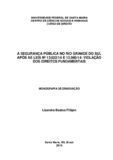| dc.contributor.advisor | Cezne, Andrea Nárriman | |
| dc.creator | Fillipin, Lizandra Bastos | |
| dc.date.accessioned | 2017-08-21T17:08:21Z | |
| dc.date.available | 2017-08-21T17:08:21Z | |
| dc.date.issued | 2015-12-02 | |
| dc.date.submitted | 2015 | |
| dc.identifier.uri | http://repositorio.ufsm.br/handle/1/11501 | |
| dc.description | Trabalho de conclusão de curso (graduação) - Universidade Federal de Santa Maria, Centro de Ciências Sociais e Humanas, Curso de Direito, RS, 2015. | por |
| dc.description.abstract | This study aims to analyze if with the enactment of Law No. 13.022 of 2014, which talks about the General Status of Municipal Guards and No. 13.060 of 2014, which regulates the use of instruments of minor offensive potential by law enforcement officials around the national territory, there was violation of public security in the state of Rio Grande do Sul. It used deductive approach method and the method of Comparative procedure. Public security is treated as a fundamental right and is analyzed briefly the Principle of Human Dignity and the fundamental rights to life, to equality, to security and property. Also is studied from the art. 144 of the Federal Constitution of 1988 the organs responsible for the Public Safety, being this study directed to the Military Police, called Military Brigade in the state of Rio Grande do Sul. In § 8 of the said article there is a provision of the Municipal Guard, which is also analyzed. It appears that there are difficulties in the execution of Law 13.060 / 14 in Rio Grande do Sul, and wonders whether the prohibition of firearm use in certain situations. In addition, there was the expansion of the competence of the Municipal Guard, from the Law 13.022 / 14. We conclude that both laws are shown beset with unconstitutionality, directly hurting the fundamental right to public security, as also in reflex pathway injuring the Principle of Human Dignity and the fundamental rights to life, to equality, to security and to property. | eng |
| dc.language | por | por |
| dc.publisher | Universidade Federal de Santa Maria | por |
| dc.rights | Acesso Aberto | por |
| dc.subject | Direitos fundamentais | por |
| dc.subject | Lei 13.022/14 | por |
| dc.subject | Lei 13.060/14 | por |
| dc.subject | Brigada Militar | por |
| dc.subject | Guarda municipal | por |
| dc.subject | Public safety | por |
| dc.subject | Fundamental rights | por |
| dc.subject | Law 13.022 of 2014 | por |
| dc.subject | Law 13.060 of 2014 | por |
| dc.subject | Military brigade | por |
| dc.subject | Municipal guard | por |
| dc.subject | Segurança pública | por |
| dc.title | A segurança pública no Rio Grande do Sul após as leis nº 13.022/14 e 13.060/14: violação dos direitos fundamentais | por |
| dc.title.alternative | Public safety in rio grande do sul after the law no. 13.022 / 14 and 13.060 / 14: violation of fundamental rights | eng |
| dc.type | Trabalho de Conclusão de Curso de Graduação | por |
| dc.degree.local | Santa Maria, RS, Brasil | por |
| dc.degree.graduation | Direito | por |
| dc.description.resumo | O presente estudo visa analisar se com o advento da Lei nº 13.022/14, que dispõe
sobre o Estatuto Geral das Guardas Municipais e nº 13.060/14, que disciplina o uso
dos instrumentos de menor potencial ofensivo pelos agentes de segurança pública,
em todo o território nacional, houve violação à Segurança Pública no Estado do Rio
Grande do Sul. Utiliza-se o método de abordagem dedutivo e o método de
procedimento comparativo. Trata-se Segurança Pública como um direito
fundamental e analisa-se brevemente o Princípio da Dignidade da Pessoa Humana,
e os direitos fundamentais à Vida, à Igualdade, à Segurança e à Propriedade.
Também estuda-se a partir do art. 144 da Constituição Federal de 1988 os órgãos
responsáveis pela efetivação da Segurança Pública, sendo este estudo direcionado
à Polícia Militar, denominada Brigada Militar no Estado do Rio Grande do Sul. No §
8º do referido artigo há a previsão da Guarda Municipal, que também é analisada.
Verifica-se que há dificuldades na efetivação da Lei 13.060/14 no Rio Grande do
Sul, e questiona-se a proibição do uso de arma de fogo em determinadas situações.
Além disso, ocorreu a ampliação da competência da Guarda Municipal, a partir da
Lei 13.022/14. Conclui-se que ambas as leis se mostram eivadas de
inconstitucionalidade, ferindo diretamente o direito fundamental à Segurança
Pública, como também em via reflexa ferindo o Princípio da Dignidade da Pessoa
Humana e os direitos fundamentais à Vida, à Igualdade, à Segurança e à
Propriedade. | por |
| dc.publisher.country | Brasil | por |
| dc.publisher.initials | UFSM | por |
| dc.subject.cnpq | CNPQ::CIENCIAS SOCIAIS APLICADAS::DIREITO | por |
| dc.publisher.unidade | Centro de Ciências Sociais e Humanas | por |


